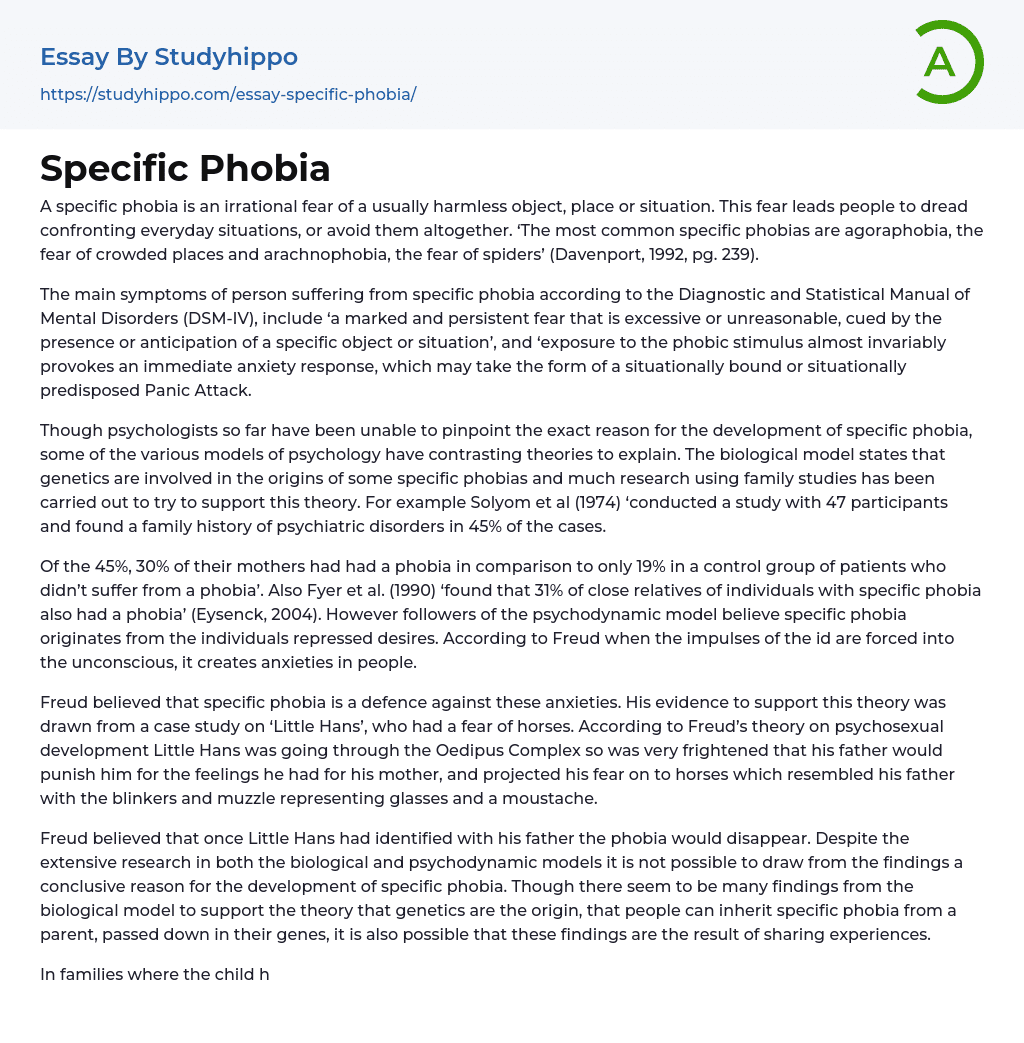A specific phobia is an irrational fear of a usually harmless object, place or situation. This fear leads people to dread confronting everyday situations, or avoid them altogether. ‘The most common specific phobias are agoraphobia, the fear of crowded places and arachnophobia, the fear of spiders’ (Davenport, 1992, pg. 239).
The main symptoms of person suffering from specific phobia according to the Diagnostic and Statistical Manual of Mental Disorders (DSM-IV), include ‘a marked and persistent fear that is excessive or unreasonable, cued by the presence or anticipation of a specific object or situation’, and ‘exposure to the phobic stimulus almost invariably provokes an immediate anxiety response, which may take the form of a situationally bound or situationally predisposed Panic Attack.
Though psychologist
...s so far have been unable to pinpoint the exact reason for the development of specific phobia, some of the various models of psychology have contrasting theories to explain. The biological model states that genetics are involved in the origins of some specific phobias and much research using family studies has been carried out to try to support this theory. For example Solyom et al (1974) ‘conducted a study with 47 participants and found a family history of psychiatric disorders in 45% of the cases.
Of the 45%, 30% of their mothers had had a phobia in comparison to only 19% in a control group of patients who didn’t suffer from a phobia’. Also Fyer et al. (1990) ‘found that 31% of close relatives of individuals with specific phobia also had a phobia’ (Eysenck, 2004). However followers of the psychodynamic model believe specific phobia originates from the individuals represse
desires. According to Freud when the impulses of the id are forced into the unconscious, it creates anxieties in people.
Freud believed that specific phobia is a defence against these anxieties. His evidence to support this theory was drawn from a case study on ‘Little Hans’, who had a fear of horses. According to Freud’s theory on psychosexual development Little Hans was going through the Oedipus Complex so was very frightened that his father would punish him for the feelings he had for his mother, and projected his fear on to horses which resembled his father with the blinkers and muzzle representing glasses and a moustache.
Freud believed that once Little Hans had identified with his father the phobia would disappear. Despite the extensive research in both the biological and psychodynamic models it is not possible to draw from the findings a conclusive reason for the development of specific phobia. Though there seem to be many findings from the biological model to support the theory that genetics are the origin, that people can inherit specific phobia from a parent, passed down in their genes, it is also possible that these findings are the result of sharing experiences.
In families where the child has the same specific phobia as the parent it is likely that as so much time is spent together that the child has copied the phobia after the parent has revealed great fear in front of them for example, the parent may have a fear of spiders and so cries out at the sight of one. If the child is present and see the parent showing fear at the sight
of a spider they in all probability will too develop a specific phobia.
This would mean that the results from biological studies on families and specific phobias can’t be used specifically to find the origin of specific phobia. Also with the psychodynamic model there is no concrete evidence of specific phobia originating as a defence to anxieties created by the repression of desires. In the case study the main source of data was collected by Hans’ father and recorded to Freud in letters.
When talking to his father Hans revealed that he had seen a very bad accident involving a horse falling down when attached to a cart, Hans’ mother confirmed this. He also spoke of two other minor incidents involving horses, both had instilled fear. This implies the specific phobia was the result of seeing actual incidents involving horses which frightened Hans and he was not actually projecting his fear of his father on to horses.
- Tension essays
- Abnormal Psychology essays
- Abraham Maslow essays
- Attachment Theory essays
- Authority essays
- Behaviorism essays
- Classical Conditioning essays
- Cognitive Psychology essays
- Counseling essays
- Developmental Psychology essays
- Educational Psychology essays
- Erik Erikson essays
- Family Therapy essays
- Jean Piaget essays
- Maslow's Hierarchy Of Needs essays
- Mental Health essays
- Operant Conditioning essays
- Personality Psychology essays
- Positive Psychology essays
- Psychoanalysis essays
- Psychotherapy essays
- Sigmund Freud essays
- Social Psychology essays
- Stanford Prison Experiment essays
- Supersize Me essays
- Adhd essays
- Antisocial Personality Disorder essays
- Anxiety essays
- Bipolar Disorder essays
- Depression essays
- Depression And Anxiety essays
- Dyslexia essays
- Learning Disability essays
- Major Depressive Disorder essays
- Mental Disorder essays
- Mental Illness essays
- Psychosis essays
- Schizophrenia essays
- Stress essays
- Suicide essays
- Bias essays
- Big Five Personality Traits essays
- Body Image essays
- Mind essays
- Motivation essays
- Phobias essays
- Thought essays




